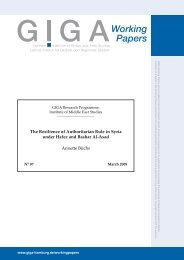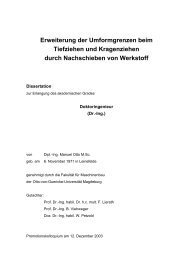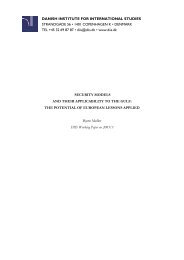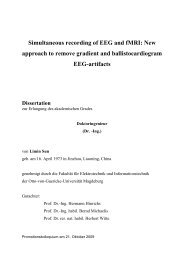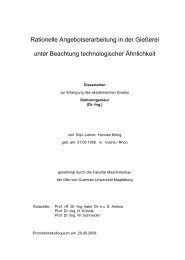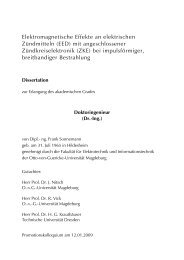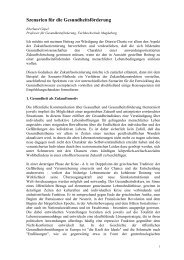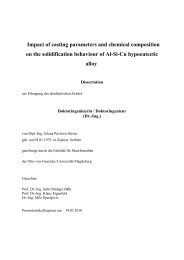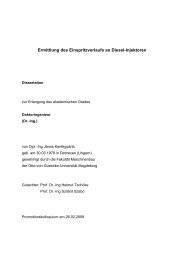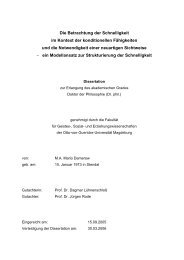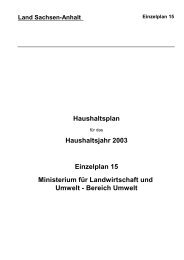Chapter 1
Chapter 1
Chapter 1
You also want an ePaper? Increase the reach of your titles
YUMPU automatically turns print PDFs into web optimized ePapers that Google loves.
domestic production, and inducing avoidance of customs taxes on international trade in total revenue are similar to<br />
duties with strong repercussions on fiscal revenues. A fur- those of other developing countries. Nevertheless, a comther<br />
restructuring and simplification of the tariff system will parison with the respective average shares for the European<br />
be achieved with the establishment of a free trade area with Union reveals that taxes on international trade play too big<br />
the European Union (EU). a role in the Tunisian fiscal accounts, reflecting both a relatively<br />
high protection for domestic production and a dimin-<br />
Government revenues ished ability to raise revenues from other tax sources, particularly<br />
on income and on goods and services.<br />
Total revenues decreased from 31.8 percent of GDP in 1986 Improvements in the VAT system should help increase the<br />
to 27.4 percent in 1993. To a large extent, this was due to a importance of taxes on goods and services. Broadening the<br />
steady decline in nontax revenues, especially from the petro- base and strengthening collection enforcement is indisleum<br />
sector. Tax revenues fell by 2.6 percentage points of pensable to bring taxes on income (especially on individual<br />
GDP in 1987, the first year of the stabilization program;<br />
thereafter, they stabilized at about 20-21 percent of GDP<br />
income) up to international averages.<br />
(figure 1.4, table 1.5, and table SA.2). The shares of all taxrevenue<br />
categories, with the exception of taxes on goods<br />
Fiscal expenditures<br />
and services, have remained quite stable since 1987. Since Since 1986, the Tunisian government has followed a policy<br />
the imposition of the VAT in 1988, taxes on goods and ser- of fiscal expenditure reduction to compensate for the<br />
vices have become an increasingly important revenue decline in oil revenues and the increased debt-service paysource.<br />
ments. At the same time, the weights of different expendi-<br />
Regarding tax revenues as a share of GDP, Tunisia's fis- ture categories have been changed to reflect the new govcal<br />
performance compares quite favorably to that of other einment priorities and its effort to improve the efficiency of<br />
developing countries, and Middle-Eastem countries in par- fiscal resource use. Total fiscal expenditures fell from 37.3<br />
ticular (table 1.6). The fact that such good performance has percent of GDP in 1986 to 29.9 percent of GDP in 1993<br />
been achieved with moderate marginal tax rates is an indi- (table 1.5 and figure 1.5). Most of this decline was<br />
cation of the high compliance ratio achieved by the Tunisian accounted for by reductions in capital expenditures (5.2<br />
tax administration. This is true except for income taxes, percentage points.) Current expenditures could only be<br />
which represent a notoriously low fraction of government reduced by 2.3 percentage points.<br />
revenues compared to other countries with a similar tax rate For current expenditures, the wage bill remains the<br />
structure. The shares of taxes on goods and services and largest category: the average wage bill from 1987 to 1993<br />
FIGURE 1.4 FIGURE 1.5<br />
Central government revenue Central govemment expenditures<br />
Percent of GDP Percnt of GDP<br />
35.0 45.0<br />
30.0 40.0 ToW eperdire<br />
25.0 30.0<br />
20.0 ------'' -------------- 25.0<br />
20.0<br />
15.0 5.0<br />
10.0 Non-ax revwje 10.0<br />
----- CA$Jcpenit !!res<br />
505.0 Net .drlg<br />
0<br />
0 -5.0<br />
1980 1981 1982 1983 1984 1985 1986 1987 1988 1989 1990 1991 1992 1993 1980 1911 1982 1983 1984 1985 1986 1987 1988 1989 1990 1991 1992 1993<br />
Swrce: Miniby od Eiawm Deebpment. Same: Mi*by dEcononf c Devopmet<br />
MACROECONOMIC POICY 9



